Unlocking the Best POS System for Convenience Store: Maximize Profits & Boost Efficiency
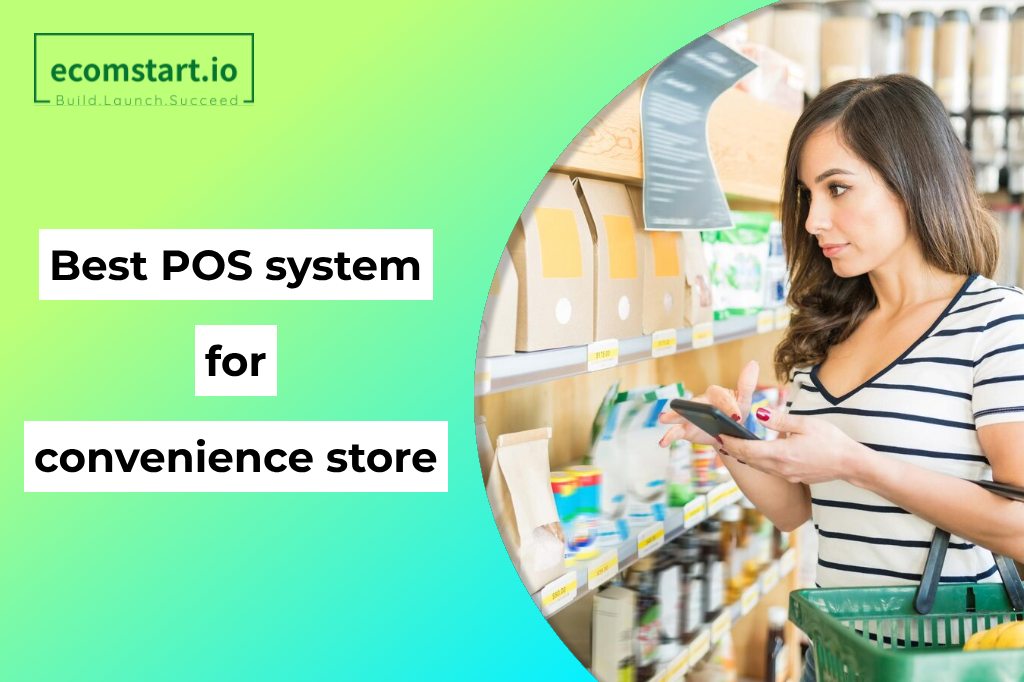
The convenience store industry is a high-octane world where speed and customer satisfaction are paramount. Every second counts, and every item matters. Thus, efficiency is definitely a key in the fast-paced world of convenience stores.
To thrive in this high-paced environment, you need the best POS system for convenience store – a powerful solutions that will be the nerve center of your operation.
However, with numerous options available, making an informed decision can be challenging. This article will explore key factors to consider and highlight some of the top POS systems tailored for the convenience store industry.
Let’s explore how the right technology can transform your store into a more efficient, profitable, and customer-friendly business!
Contents
- 1. Best POS system for convenience store: A comparison
- 2. What is the best POS system for convenience store?
- 3. A detailed analysis of the best POS systems for convenience store
- 3.1. Shopify POS – Best for convenience stores that value various integration
- 3.2. Clover – Best for convenience stores with food service
- 3.3. EPOS Now – Best for flexible inventory management
- 3.4. Square – Best for mobile flexibility
- 3.5. KORONA POS – Best for well-optimized checkout
- 3.6. Revel POS – Best for strong customer loyalty
- 4. What features does the best POS system for convenience store need?
- 5. Conclusion
- 6. FAQs
1. Best POS system for convenience store: A comparison
| Best for | Pricing | Transaction fees from | Key Features | |
| Shopify POS | Best for convenience stores that value various integration | $5/month – $89/month | Depends on the payment providers | Unified management, product control, flexible payments, customer loyalty, sales insights, system integration. |
| Clover | Best for convenience stores with food service | $15/month – $200/month | Start from 2.3% + 0.10 | Optimized checkout, automated inventory, order management, kitchen efficiency, offline payments. |
| EPOS Now | Best for flexible inventory management | $24/month – Custom | Custom | Efficiency, inventory management, customer focus, data insights, system integration. |
| Square | Best for mobile flexibility | Free – $29/month | Start from 2.6% + $0.10 | Inventory tracking, barcode scanning, diverse payments, quick checkouts, detailed receipts, easy returns, employee scheduling. |
| KORONA POS | Best for well-optimized checkout | $59/month – $69/month | Custom | Scalability, speed, inventory, employee management, customer focus, security. |
| Revel POS | Best for strong customer loyalty | Starts at $99 per terminal | Custom | Inventory tracking, product variations, low stock alerts, mobile payments, customer focus. |
2. What is the best POS system for convenience store?
Convenience stores operate in a fast-paced, high-turnover environment that demands efficient operations. This is where a Point of Sale (POS) system becomes indispensable.
For convenience stores, it’s the nerve center of operations, handling everything from sales and inventory management to customer data and reporting.
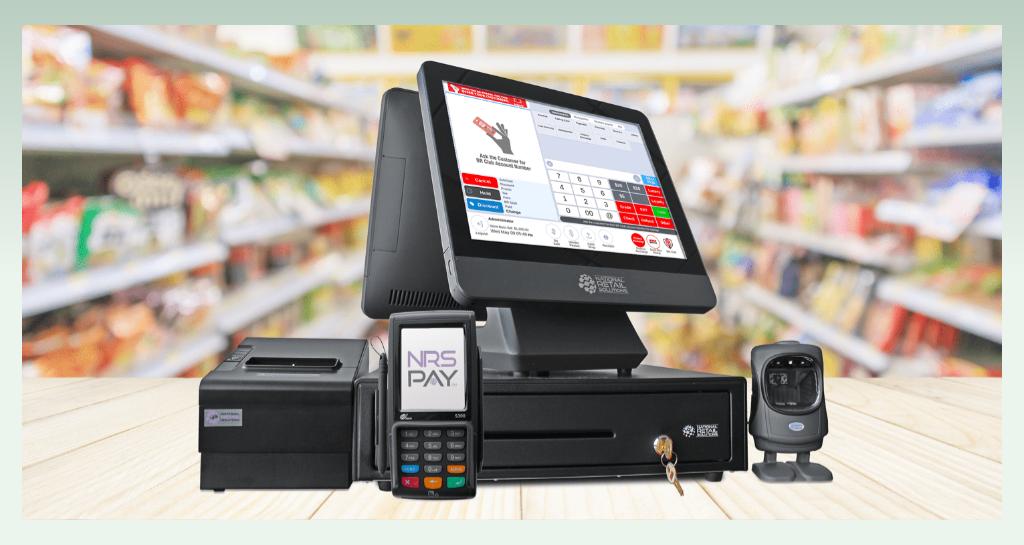
Convenience stores face unique challenges that a POS system can effectively address:
- High-volume transactions: POS systems expedite checkout processes, reducing wait times and improving customer satisfaction.
- Limited space: Efficient inventory management through POS helps optimize product placement and prevents stockouts or overstocking.
- Diverse product range: POS systems can handle a wide variety of products, from snacks to household items, with ease.
- 24/7 operations: Real-time sales data provided by POS systems enables informed decisions about staffing and inventory levels.
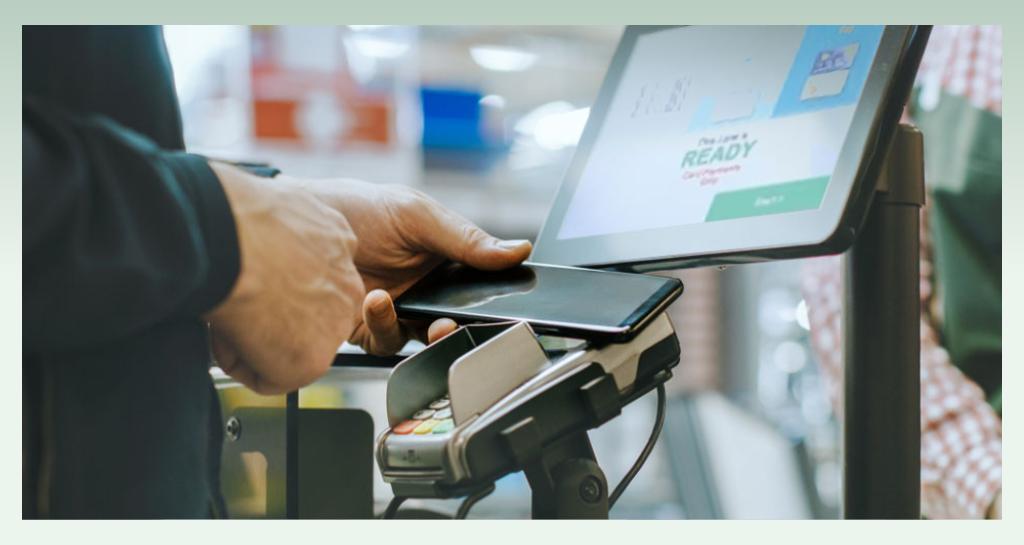
These challenges demand efficient operations and a keen understanding of customer needs. A well-implemented POS system emerges as a critical tool to navigate these complexities and drive business growth. Here is a breakdown of what the best POS system for convenience store can do for you:
- Speed Up Your Store: POS systems can scan items quickly, process payments fast, and keep lines moving. This means happier customers and more time for your staff to help people.
- Keep Track of Your Stuff: Knowing what you have and what you need to order is key. A POS system can help you keep tabs on your inventory, so you always have the right products on your shelves.
- Build Loyal Customers: Many POS systems let you create customer loyalty programs. Reward your regulars and watch them come back for more.
- Manage Your Staff Effectively: Some POS systems include tools for scheduling shifts and managing employee hours. This helps you optimize labor costs and ensure adequate staffing.
- Make Smarter Decisions: With a POS system, you can see what’s selling well and what’s not. This helps you decide what to stock, when to run sales, and how to please your customers.
🔍To find out a more specific features about Shopify POS, check out our in-depth Shopify POS Reviews, which covers everything from pricing to performance, which help you decide if it is the right solution for your business
By choosing the best POS system for convenience store, owners can improve operational efficiency, enhance customer experience, and boost their bottom line.
In the following sections, we will delve deeper into the essential features of a robust POS system for convenience stores and conduct a comprehensive analysis of top-tier solutions tailored to meet the unique demands of this industry. Let’s get started!
3. A detailed analysis of the best POS systems for convenience store
3.1. Shopify POS – Best for convenience stores that value various integration
Considered the best POS system for a small business, Shopify POS has emerged as a popular choice for retailers seeking a user-friendly and efficient point-of-sale system. Its seamless integration with the Shopify eCommerce platform makes it particularly attractive to convenience stores looking to streamline operations and enhance customer experience.
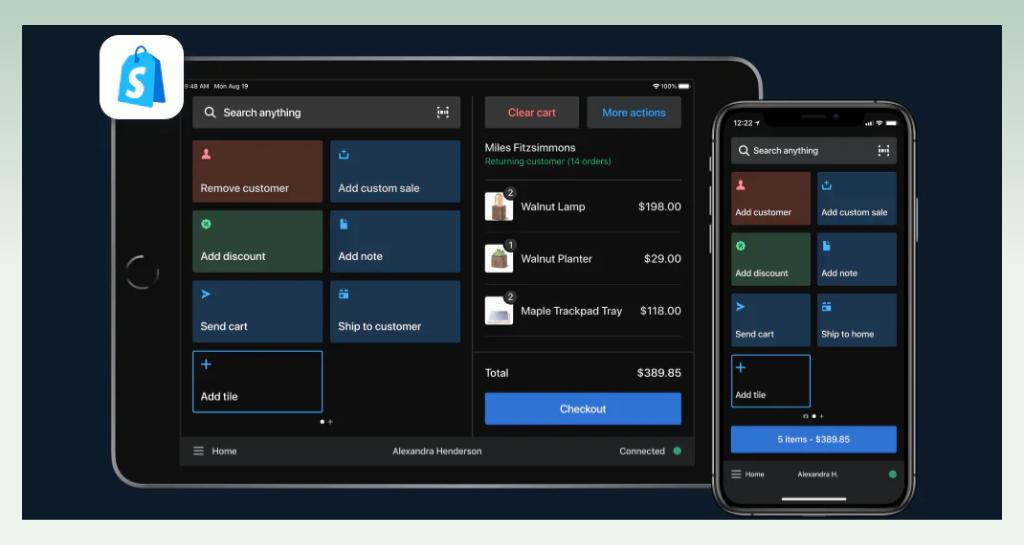
Convenience stores operate in a fast-paced environment characterized by high transaction volumes, diverse product offerings, and limited space. Shopify POS excels in addressing these challenges:
- Centralized Management: Manage online and in-store operations from a single dashboard.
- Product Management: Easily manage a wide variety of products, including tracking expiration dates and product variants.
- Payment Flexibility: Accept cash, credit cards, and digital wallets to cater to diverse customer preferences.
- Customer Loyalty: Build a loyal customer base through rewards programs and personalized offers.
- Sales Reporting: Gain valuable insights into product performance, sales trends, and customer behavior.
- Integration Capabilities: Connect with a wide variety of third-party apps for accounting, inventory, and shipping.
Shopify POS offers two plans, Shopify POS Lite and Shopify POS Pro:
- Shopify POS Lite: Included with all Shopify eCommerce plans (Basic Shopify, Shopify, and Advanced Shopify) or $5/month for a standalone option.
- Shopify POS Pro: $89/month per location (except for Shopify Plus plans, which include it for free).
🔍To learn more about the differences and features of Shopify Pricing Plan, be sure to check out the detailed POS Lite vs POS Pro comparison for more insightful information.
Shopify transaction fees vary depending on your chosen Shopify plan:
| POS Lite | POS Pro | Basic Shopify | Shopify | Advance Shopify | |
| Transaction fees | 5% 3rd-party payment providers | 2% 3rd-party payment providers | 2.9% + $0.30 online payments2.6% + $0.10 in person | 2.7% + $0.30 online payments2.5% + $0.10 in person | 2.5% + $0.30 online payments2.4% + $0.10 in person |
| Hardware packages | – Existing Devices: Shopify POS can work on your iOS or Android device. – Optional Hardware: + Chip & Tap Card Reader: $49 + Retail Kit (cash drawer, receipt printer, stand): $219 + Shopify POS Go (mobile device): $399 + Barcode scanners: $229-$329 + Label printers: $299-$499 + Receipt printers: $299-$369 + Cash drawers: $139-$159 | ||||
>> Explore the key differences between Shopify vs Lightspeed to choose the perfect-fit POS system for your store!
3.2. Clover – Best for convenience stores with food service
Clover POS is ideal for convenience stores, especially those with food service. Key benefits include faster checkouts, efficient inventory management, streamlined food ordering, and customer loyalty programs.

With its emphasis on speed, efficiency, and customer engagement, it can help you streamline operations, boost sales, and keep your customers coming back for more.
- Faster Checkouts: Clover boasts lightning-fast processing, keeping lines short and customers happy, which is crucial for convenience stores with high foot traffic.
- Inventory Management: Automate inventory tracking with low-stock alerts to prevent stockouts.
- Order Management: Clover can handle both in-store and online food orders, making it easier to manage dine-in, takeout, and delivery services.
- Kitchen Display System (KDS): Many Clover plans include a KDS, which helps streamline kitchen operations and improve order accuracy.
- Offline Payment Processing: Clover allows you to take payments offline and process them later.
When comparing Shopify vs Clover, Clover offers a unique pricing model that caters to the specific needs of different business types. This means that a convenience store will have different pricing options compared to a restaurant or a retail store.
| Starter | Standard | Advanced | |||
| Full-Service Dining | $165/month | $220/month | $220/month | ||
| Quick Service Restaurant | $105/month | $145/month | $200/month | ||
| Retail Shops | $60/month | $135/month | $190/month | ||
| Professional Services | $0+ $14.95/month | $50/month | $125/month | ||
| Personal Services | $50/month | $95/month | $135/month | ||
| Home & Field Services | $0+ $14.95/month | $49+ $14.95/month | $50/month | ||
| Transaction fees | 2.3% + 0.10 for card-present transactions 3.5% + 0.10 for keyed-in transactions | ||||
| Hardware packages | Prices for Clover hardware range from approximately $599 to $1799 | ||||
3.3. EPOS Now – Best for flexible inventory management
Epos Now is a cloud-based point-of-sale (POS) system designed to streamline operations for small and medium-sized businesses, particularly convenience stores. Known for its user-friendly interface and focus on efficiency, Epos Now has gained popularity among retailers seeking a robust and scalable solution.

Epos Now’s features align well with the fast-paced environment of convenience stores, offering tools for quick transactions, inventory management, and customer engagement.
- Speed and Efficiency: Epos Now prioritizes quick transactions, essential for convenience stores with high customer traffic.
- Inventory Management: Robust inventory tracking, including barcode management, stock alerts, and purchase order generation.
- Customer Management: Build customer loyalty through loyalty programs and personalized offers.
- Payment Flexibility: Accept various payment methods, including cash, card, and contactless options.
- Cloud-Based Platform: Access data and manage your business from any device with an internet connection.
Epos Now offers a flexible pricing structure that accommodates various business needs and budgets. The cost of Epos Now software is typically bundled with hardware packages. However, it’s essential to inquire about standalone software pricing if needed.
In addition, payment processing fees are applied to card transactions and vary depending on the chosen payment provider.
Let’s break down the cost components:
| Complete System | – Include a touchscreen POS system, cash drawer, and printer. – One-time payment of $999 – Or a monthly fee of $72 over three years. |
| Handheld System (Epos Pocket) | – Plan One: $0 upfront, $44 monthly – Plan Two: $189 upfront, $24 monthly |
| Tablet System | – Include iPad or Android tablet, stand, cash drawer, and receipt printer. – Start at $599. |
3.4. Square – Best for mobile flexibility
Square POS is a popular choice for smaller retail businesses that prioritize simplicity and mobility. Its tablet-based system is particularly well-suited for stores with lower transaction volumes and a focus on customer experience.
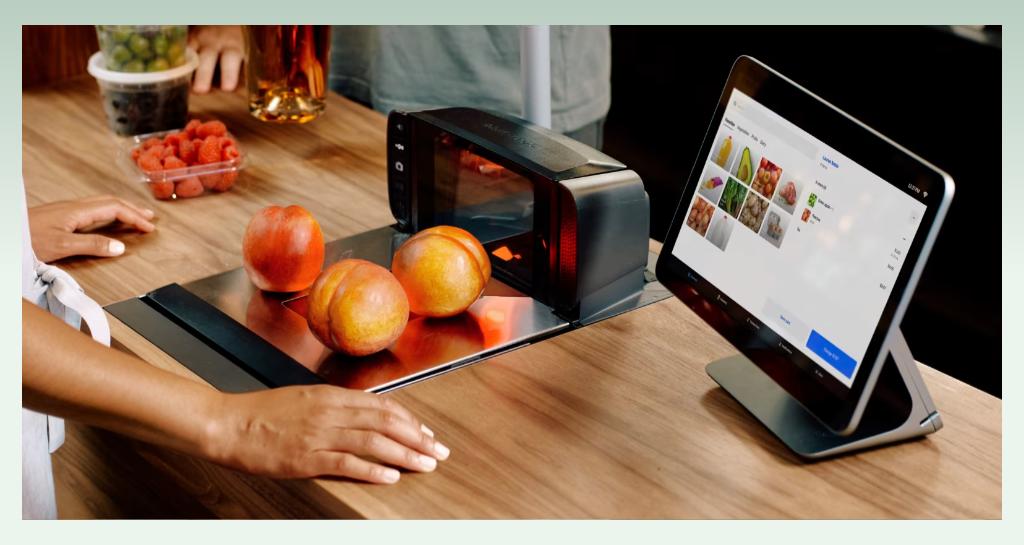
Square POS offers several features designed to support the unique needs of convenience stores:
- Real-time tracking: Monitor stock levels accurately to prevent stockouts and overstocking.
- Quick checkout: Streamline the checkout process to improve customer satisfaction.
- Itemized receipts: Provide customers with detailed receipts, including product descriptions and prices.
- Refunds and returns: Easily process returns and exchanges.
- Employee scheduling: Create and manage employee shifts.
- Permissions: Control access to different POS functions for various employee roles.
Square offers various pricing plans for convenience stores:
| Free plan | Plus | Premium | |
| Price | Free | From $29/month | Custom |
| Transaction fees | 2.6% + $0.10 for card-based transaction 3.5% + $0.15 for manual keyed-in sales 2.9% + $0.30 for eCommerce payments | ||
| Hardware packages | – All-in-one POS with dual screens: $799 – Compact card reader and receipt printer: $299 – iPad-based POS with integrated payments: $149 – For existing iPads: $149 – Compact card reader: $59 (2nd gen) | ||
>> Check an in-depth comparison between Shopify vs Square to find out the best POS system for convenience store!
3.5. KORONA POS – Best for well-optimized checkout
KORONA POS has established itself as a robust and feature-rich POS system, particularly well-suited for convenience stores. Its emphasis on efficiency, inventory management, and customer engagement makes it a strong contender in the market.
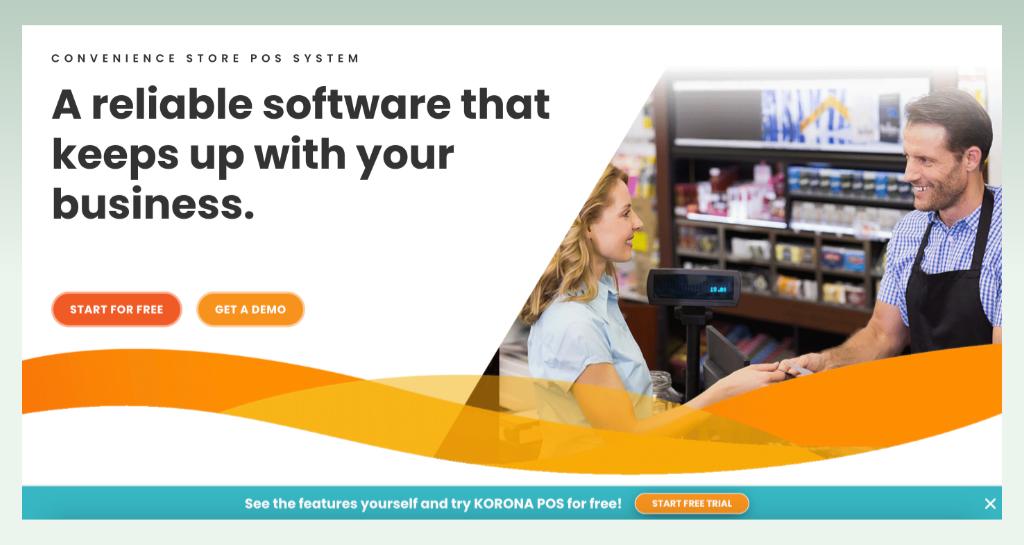
KORONA POS is said to be a feature-rich solution tailored to the specific needs of convenience stores:
- Multi-store Management: Handles multiple store locations with ease.
- Efficient Transaction Processing: KORONA POS is designed to handle high transaction volumes quickly and accurately.
- Inventory Management: Offers robust tools for tracking stock levels, preventing shortages, and optimizing product assortment.
- Employee Management: Streamlines scheduling, time tracking, and permission management.
- Security: Includes features like age verification and theft prevention.
- Scalability: Even during peak hours, KORONA POS can handle increased customer traffic without compromising checkout efficiency.
While KORONA POS excels in many areas for convenience stores, a notable limitation is the absence of native fuel integration. This can be a significant drawback for convenience stores with gas stations.
KORONA offers a flexible pricing structure:
| Core | Retail | |
| Price | $59/month | $69/month |
| Transaction fees | Custom pricing | |
| Add-on features | – KORONA Food: +$10/month per terminal (For restaurants) – KORONA Invoicing: +$10/month per terminal (For businesses needing invoicing) – KORONA Ticketing: $50/month per gate (For admission-based businesses) – KORONA Franchise: +$30/month per franchise location – KORONA Integration: +$45/month per token (For integrating with other systems) | |
| Hardware packages | KORONA POS does not publicly disclose specific hardware pricing on its website. To obtain accurate and up-to-date hardware pricing information, it’s essential to contact KORONA POS directly. | |
3.6. Revel POS – Best for strong customer loyalty
Revel POS is a cloud-based point-of-sale system known for its robust features and scalability. With its intuitive interface and mobile-friendly design, Revel equips store associates with the tools they need to process transactions quickly and accurately, ensuring customer satisfaction and minimizing wait times.
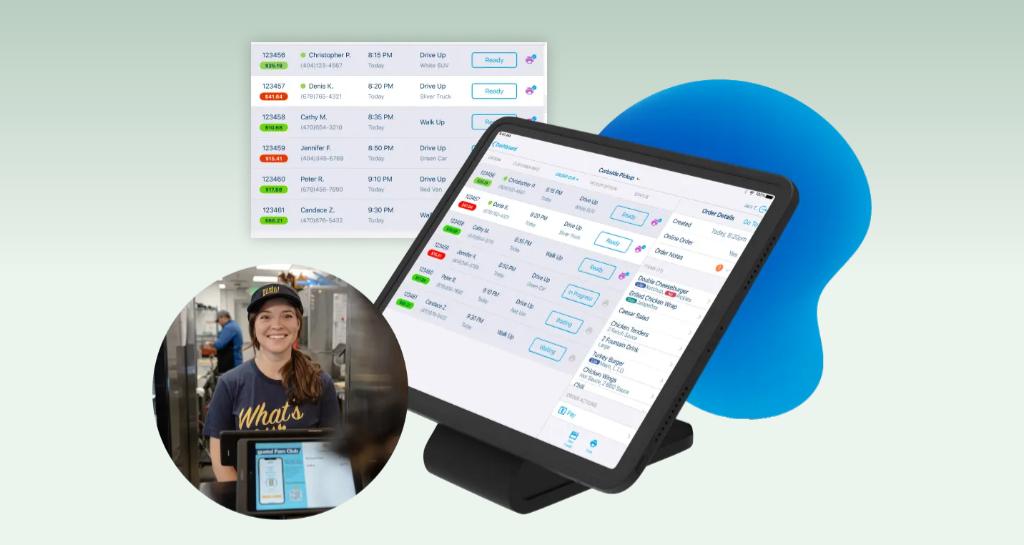
It offers a robust set of features that make it a viable option for convenience stores:
- Inventory Management: Tracking expiration dates, lot numbers, and price variations.
- Automated Reordering System: Prevent stockouts and overstocking.
- Customer Engagement: Build strong customer loyalty through rewards programs, personalized promotions, and effective customer data management.
- Mobile POS: Accept payments on the go with Revel’s mobile app, enhancing customer convenience and operational flexibility.
- Integration Capabilities: Connect with various third-party applications to expand the functionality of your POS system.
Revel POS positions itself as a premium POS solution, offering a robust feature set designed for various business sizes. Its key pricing components include:
- Monthly Software Fee: Starts at $99 per terminal, covering core POS functionalities, inventory, employee, customer management, and reporting.
- Payment Processing Fees: Flat-rate structure, but specific rates are undisclosed.
- Onboarding Services: Optional, starting at $674 for training, setup, and hardware installation.
To obtain specific pricing information for your convenience store, it’s essential to directly contact the Revel team.
4. What features does the best POS system for convenience store need?
Selecting the right point-of-sale (POS) system can significantly impact the efficiency and profitability of your convenience store. Given the unique demands of this industry, here are some crucial factors to consider:
🔶 Inventory Management
- Product categorization: Ability to categorize products based on department (e.g., food, beverages, tobacco, lottery) for better inventory management and sales analysis.
- Shrinkage management: Tools to track and analyze inventory losses due to theft, damage, or spoilage.
- Expiration date tracking: For perishable goods, the system should allow you to set expiration dates and receive alerts when items are nearing their end-of-life.
- Vendor management: The POS should integrate with your suppliers to streamline ordering processes.
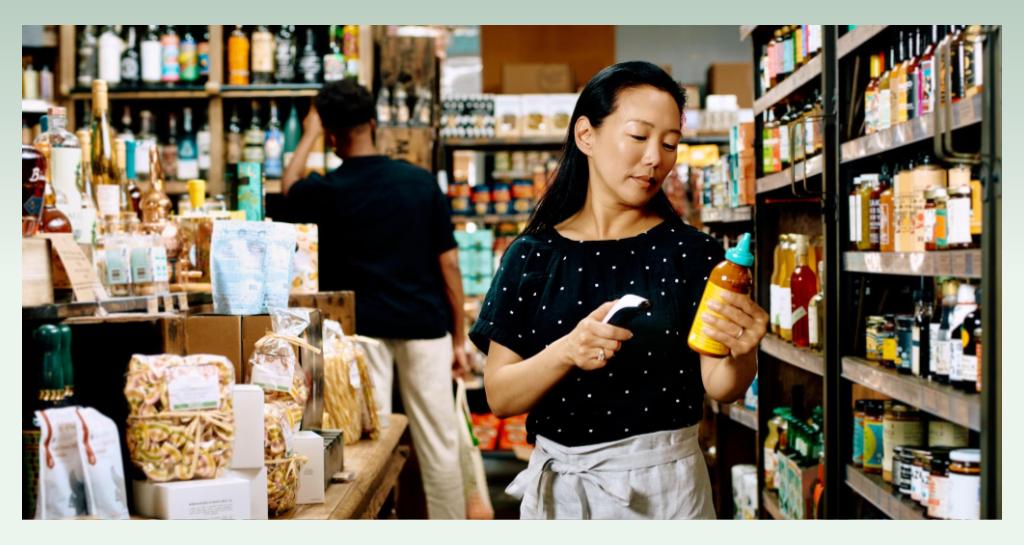
🔶 Speed and Efficiency
- Quick transactions: Given the high volume of transactions in convenience stores, the POS should be designed to process sales quickly and accurately.
- Multiple payment options: Support for various payment methods, including cash, credit cards, mobile payments, and loyalty programs.
- Integration with other systems: Ensure seamless integration with your accounting software, loyalty programs, and other business tools.
🔶 Sales and Transactions
- Fuel integration: If applicable, seamless integration with fuel pumps and loyalty programs.
- Age verification: Compliance with age-restricted products (e.g., alcohol, tobacco) through ID scanning or manual verification.
- Hot food management: For stores with hot food counters, features like item customization, portion control, and temperature monitoring.
- Lottery ticket sales: Integration with lottery systems, including ticket validation and commission tracking.
- Gift card management: Ability to sell, activate, and track gift card sales and balances.
🔶 Reporting and Analytics
- Detailed sales reports: The POS should provide comprehensive sales data, including product performance, customer demographics, and peak sales times.
- Inventory analysis: Generate reports on inventory turnover, shrinkage, and profitability.
- Labor management: Track employee hours and performance to optimize staffing levels.
By incorporating these features, the best POS system for convenience store can significantly enhance the operations of your business, improve profitability, and provide a better customer experience.
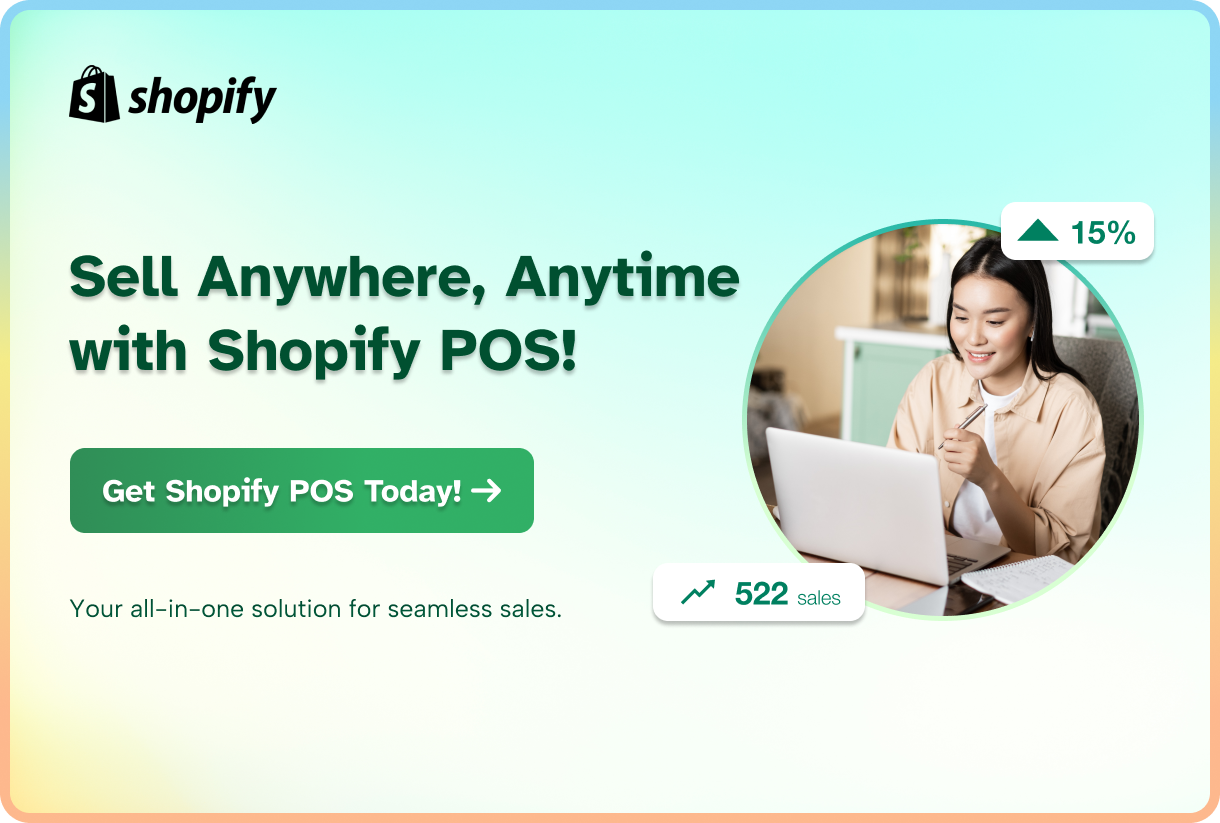
5. Conclusion
Remember, the best POS system for convenience store is a versatile tool that adapts to your store’s unique requirements. By investing in the right technology, you’ll be well-equipped to navigate the dynamic convenience store landscape and achieve long-term success.
Let’s continue to explore the world of POS systems and unlock your store’s full potential with eComStart!


